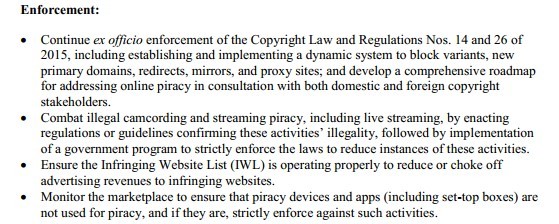 Indonesia has been very active on the anti-piracy front in recent months, with the government ordering Internet providers to block hundreds of pirate sites.
Indonesia has been very active on the anti-piracy front in recent months, with the government ordering Internet providers to block hundreds of pirate sites.
Despite these enforcement efforts, several high profile US entertainment industry groups see room for improvement in the Asian country.
The International Intellectual Property Alliance (IIPA), which includes a wide range of copyright groups including the MPA, RIAA, and ESA, made this clear in a recent submission to the US Trade Representative.
IIPA advises the U.S. government to suspend Indonesia’s GSP trade benefits if the country fails to do more to protect the interests of US copyright holders. With many millions of dollars at stake, this is a serious threat.
In their submission, IIPA acknowledges that the Indonesian government has recently taken “significant strides” to combat piracy. However, it also adds that “more should be done.”
The group notes that the movie and music industries “worked” with the government to block hundreds of websites. This resulted in some success stories, such as the recent decision by pirate site IndoXXI to voluntarily shut down.
However, blockades are not always effective. In many cases, the initial drops in traffic that occur after a blockade are undone when sites move to new domain names.
“[T]hese drops in traffic are intermittent as most well-known piracy sites employ a strategy of domain hopping—redirecting domains to circumvent the results of site-blocking efforts,” IIPA writes.
The Indonesian government has already responded to this by blocking new domains as well, but IIPA sees room for improvement on this front.
“The government should streamline the process for rights holders to ensure access to infringing sites is disabled and to deal efficiently with the problem of domain hopping,” the group writes.
These demands are clear but it remains odd to see calls for these types of drastic measures from US companies that have yet to take any action to block a single pirate site in the US itself.
IIPA’s demands don’t end there either – the copyright holders have more suggestions. For example, Indonesia should prioritize enforcement efforts against illegal camcording in theaters as well as live streaming piracy.
“The government should issue clear guidelines and regulations on illegal camcording and live streaming piracy, and take the initiative to reduce instances of these illegal activities as a priority,” IIPA writes.
In addition, piracy apps and the distribution points for piracy-enabling set-top boxes should be dealt with as well.
“IIPA encourages the Indonesian Government to take steps to crack down on piracy apps and on device retailers who preload the devices with apps that facilitate infringement, and take action against key distribution points for devices that are being used illegally.”

This is just a small selection of the demands which also include a repeal of certain copyright exceptions and an extension of the copyright term to the life of the author plus 70 years.
According to IIPA, Indonesia was on the right track but in 2019 progress stalled and even regressed. The organization hopes that by listing a wide variety of improvement opportunities, perhaps with a nudge from the US government, progress can continue.
If the US Government doesn’t see any improvement, it should suspend (some of) the existing trade benefits for the country, the rightsholder groups conclude.
“If, at the conclusion of the review, the Government of Indonesia has not made adequate progress remedying the deficiencies outlined above, IIPA requests that the Committee suspend or withdraw Indonesia’s GSP benefits, in whole or in part,” IIPA writes.
This type of pressure is not new. In 2017 the US Government sanctioned Ukraine following a similar referral from the IIPA. This triggered a wave of copyright-related actions in the country, with President Trump deciding to lift the sanctions a few months ago.
—
IIPA’s full submission to the US Trade Representative is available here (pdf).





